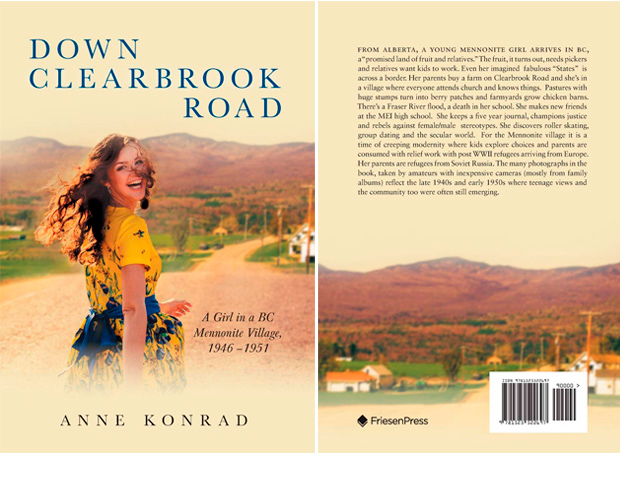MHM BOOK LAUNCH: “Down Clearbrook Road” by Anne Konrad
Presentation begins at 2:00pm at the Mennonite Heritage Museum,
Saturday, November 30, 2019
Books will be available for purchase from the MHM Bookstore
Meet the Author, Anne Konrad
This is a free event and we welcome you to bring family and friends!
Light refreshments
The Museum will be open from 1pm to 4pm and you are free to peruse the exhibits
Scroll down for more information …
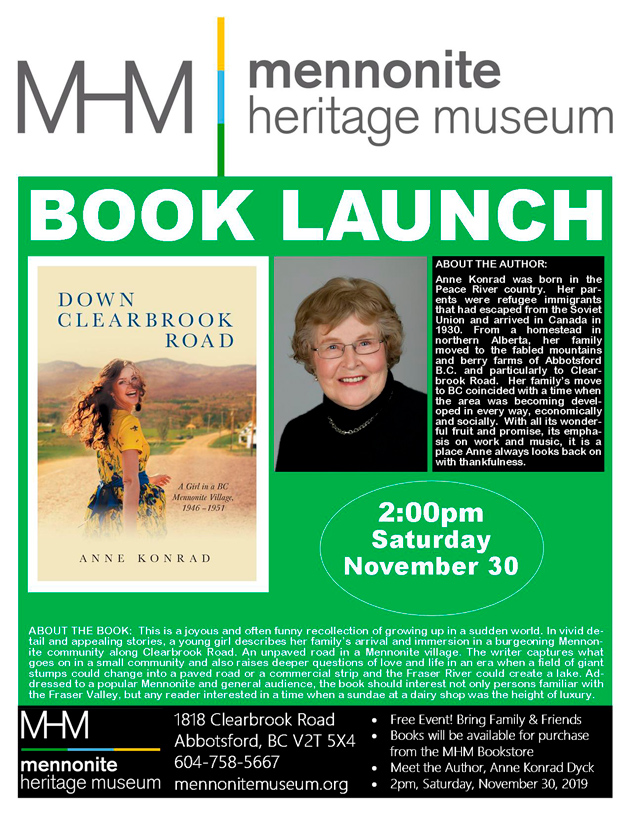
MORE ABOUT THE BOOK:
This is a joyous and often funny recollection of growing up in a sudden world. In vivid detail and appealing stories, a young girl describes her family’s arrival and immersion in a burgeoning Mennonite community along Clearbrook Road. An unpaved road in a Mennonite village.
Loosely connected domestic and community events are described to draw readers into the narrative. Some people may see themselves or family members reflected in the delightful or troubled experiences of the author
We get to know a host of characters, relatives, berry pickers, hop pickers, chicken farmers, refugees, teachers, evangelists and others. The writer captures what goes on in a small community and also raises deeper questions of love and life in an era when a field of giant stumps could change into a paved road or a commercial strip and the Fraser River could create a lake.
In this writer’s time capsule, Mennonite teenagers are testing the limits, solutions seem easy, education, hard work and church dominate and hitch-hiking is safe.
Addressed to a popular Mennonite and general audience, the book should interest not only persons familiar with the Fraser Valley, but any reader interested in a time when a sundae at a dairy shop was the height of luxury.
READERS’ COMMENTS:
“ …you have a real knack for drawing the reader further and further into the book”.
“ Everyone, especially those people who were part of the cast of characters, will enjoy it thoroughly. “
“… you tell a good story. “
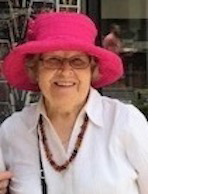
MORE ABOUT THE AUTHOR: Anne Konrad was born in the Peace River country. Her parents were refugee immigrants that had escaped from the Soviet Union and arrived in Canada in 1930. From a homestead in northern Alberta, her family moved to the fabled mountains and berry farms of Abbotsford B.C. and particularly to Clearbrook Road.
SPACE
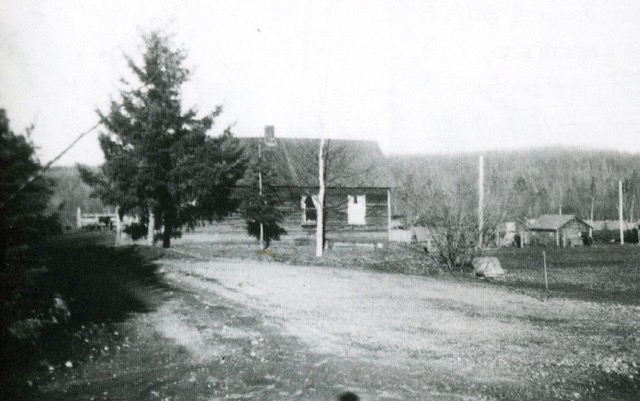
SPACE
Anne attended Mt. Lehman Superior and then spent five wonderful years at MEI, the new Mennonite Educational Institute high school built at the intersection of Old Yale and Clearbrook Roads, the present site of a condo tower. After high school she attended UBC, studying English and History and also Teacher Education. Graduating with a BA, she taught high school in Burnaby and married Harvey L. Dyck. The couple moved to New York City for Harvey to pursue graduate studies at Columbia University and for Anne to teach in thecity’s Lower East Side tenements and at a College Prep High school.
SPACE
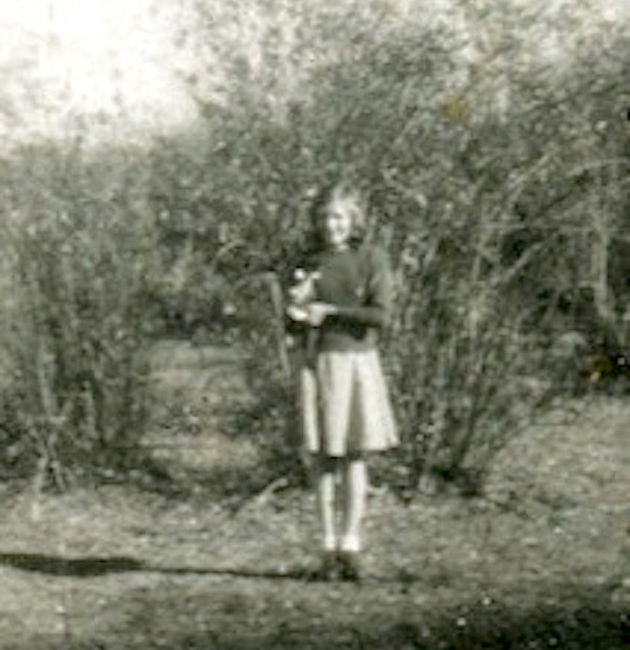
SPACE
Thereafter, Anne lived in Connecticut, New Jersey, in Bonn, Germany and in Vienna, Austria. In late 1967 she moved to Toronto with her husband and three young children. While on sabbatical in Vienna with her husband and children, she began writing her first novel, The Blue Jar. In Toronto she picked up teaching again, teaching English and ESL She was touched by the stories and lives of students in the inner city and encouraged immigrant youths in Toronto to write their stories.
In Toronto, co-raising three children, she also continued writing, editing and doing some translation, creating a novel, a collection of short stories, historical reviews and feature articles (detailed list on separate sheet). She also studied History at the University of Toronto where her interest was Ontario Native Land Claims.
She enjoyed gardening on the Bruce peninsula and was involved in numerous volunteer and community efforts. She was a member of the Toronto United Mennonite Church Vietnam Refugee Committee in the late 1970’s. For 10 years until 1993, she helped to organize literary events such as bringing in authors for public readings at the Mennonite Centre in Toronto.
She entered a short story competition, won and the result was a relationship with Netherlandic Press with whom she published the short story collection, ‘Sweeping Clean’ in Dutch Gifts (Netherlandic Press, 1991 and Family Games (Netherlandic Press, 1992).
While teaching, Anne wrote articles for Christian Living, The Globe and Mail, The Conrad Grebel Review, The Mennonite Mirror, The Mennonite Reporter, The Bruce County Historical Society, the History of Albemarle and so on.
SPACE
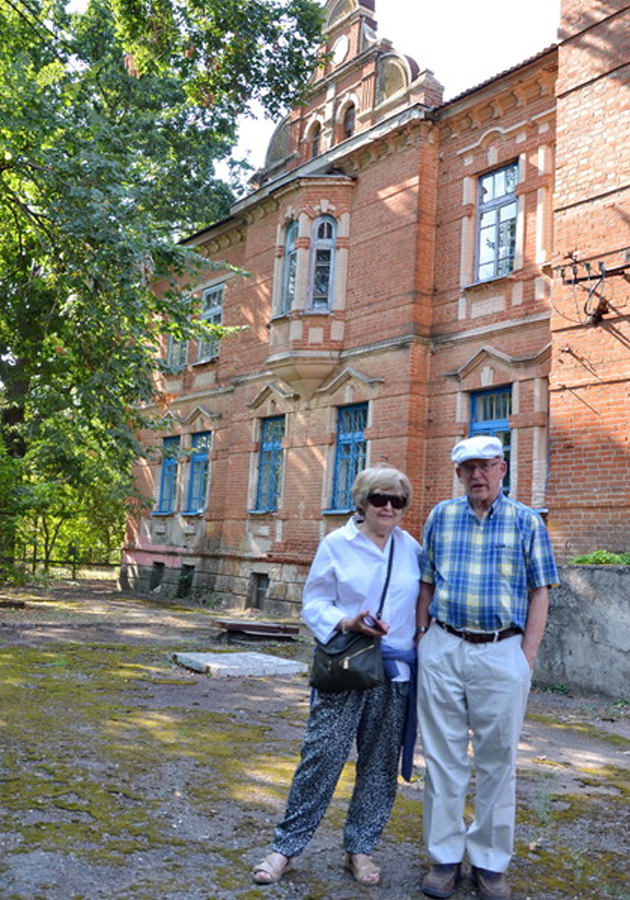
SPACE
Tangent to his work in Russian History, Anne’s husband had become deeply involved with the Mennonite story in the USSR and in today’s Ukraine and it began to rub off on Anne as well. After her parents in Abbotsford died, she acquired their papers, letters and photographs and began to put together the family saga in its historical setting. The result was a large book with 500 photographs, And in Their Silent Beauty Speak: A Mennonite Family in Russia and Canada, 1790-1990, Pandora Press, 2004.
Her book, Red Quarter Moon, A Search for Family in the Shadow of Stalin, University of Toronto Press, 2012, is based on fifteen years of trips to many parts of the former USSR and other countries searching for survivors of extended family members who had disappeared in Soviet times.
Having written about so much sorrow and pain experienced by the oppressed Russian Mennonite relatives, Anne decided to put together a happier experience, her own discovery of BC as a teenager. Her family’s move to BC coincided with a time when the area was becoming developed in every way, economically and socially. With all its wonderful fruit and promise, its emphasis on work and music, it was a place she always looked back on with thankfulness. Down Clearbrook Road is her Thank You to that experience.
PUBLICATIONS:
Translator: Historical events of the Mennonite settlement in Allen and Putnam counties, Ohio, P B Amstutz; translator Anne Konrad Dyck, 1978.
Contributor: Albemarle: A History of the Township, Albemarle Township Historical Society, Wiarton, Ontario, 1991.
Book: The Blue Jar. Queenston House Press, 1985.
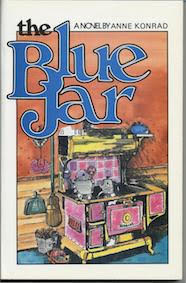
Book: Family Games (a short story collection), Netherlandic Press, 1992
SPACE
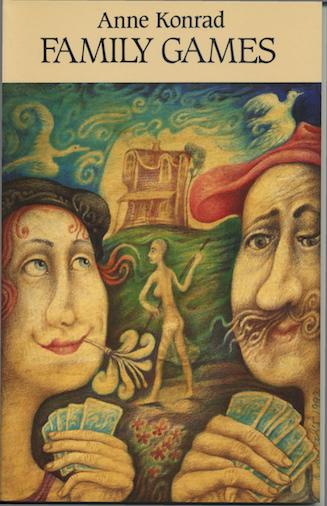
SPACE
Space
Book: And in Their Silent Beauty Speak: A Mennonite Family in Russia and Canada, 1790-1990, Pandora Press, 2004
SPACE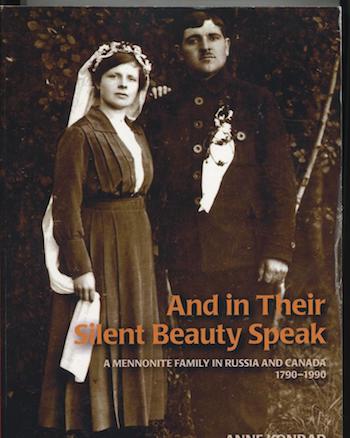
SPACE
Book: Red Quarter Moon: A Search for Family in the Shadow of Stalin, The University of Toronto Press, 2012
SPACE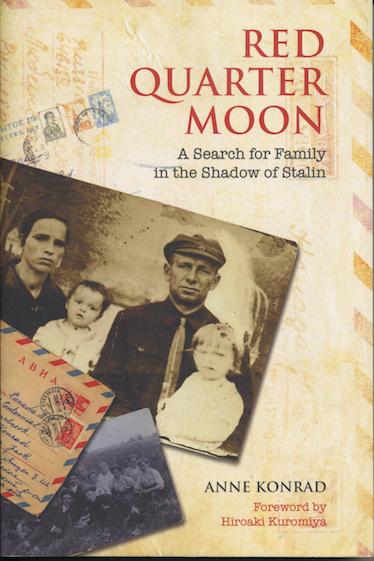
SPACE
SPACE
Short Stories
Literary journals:
Editor, A Mennonite Estate Family in Southern Ukraine, by Nicholas Fehderau. Ed. Anne Konrad, Pandora Press, Kitchener, ON, 2013
Articles: Christian Living, The Globe and Mail, The Conrad Grebel Review, The Mennonite Mirror, The Mennonite Reporter.
Short Stories in Journals:
The Antigonish Review, The new Quarterly, Forum Magazine, Festival Quarterly, Trans Lit, Christian Living, the Mennonite Mirror, The New Quarterly, The Bruce County Historical Yearbook, 1991.
Anthologies:
Braiding Hearts and Hands: A Poetry and Dramatic Arts Anthology, 1994.
Dutch Gifts: Stories, Poems and Creative Non-Fiction on a Netherlandic Theme, Netherlandic Press, 1991
Albemarle: A History of the Township, 1991.
Unity in Diversity: Student Readings, Four Worlds Development Project, The University of Lethbridge, 1988
